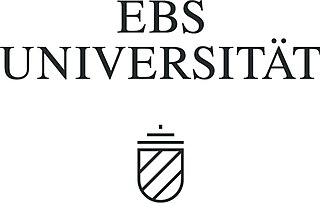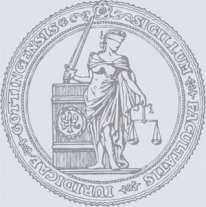Related Research Articles

A Juris Doctor, Doctor of Jurisprudence, or Doctor of Law (JD) is a graduate-entry professional degree that primarily prepares individuals to practice law. In the United States, it is the only qualifying law degree, while other jurisdictions, such as Australia, Canada, and Hong Kong, offer both JD degrees and other undergraduate qualifying law degrees.

The University of Göttingen, officially the Georg August University of Göttingen, is a distinguished public research university in the city of Göttingen, Germany. Founded in 1734 by George II, King of Great Britain and Elector of Hanover, it began instruction in 1737 and is recognized as the oldest university in Lower Saxony.

Legal education is the education of individuals in the principles, practices, and theory of law. It may be undertaken for several reasons, including to provide the knowledge and skills necessary for admission to legal practice in a particular jurisdiction, to provide a greater breadth of knowledge to those working in other professions such as politics or business, to provide current lawyers with advanced training or greater specialisation, or to update lawyers on recent developments in the law.
A Bachelor of Laws is an undergraduate law degree offered in most common law countries as the primary law degree and serves as the first professional qualification for legal practitioners. This degree requires the study of core legal subjects and jurisprudence to provide a comprehensive understanding of the legal system and its function. The LLB curriculum is designed to impart a thorough knowledge of legal principles, legal research skills, and a sound understanding of the roles and responsibilities of lawyers within society. This degree is often a prerequisite for taking bar exams or qualifying as a practising lawyer, depending on the jurisdiction. Additionally, the LLB program also serves as a foundation for further legal education, such as a Master of Laws (LLM) or other postgraduate studies in law.

A Fachhochschule, abbreviated FH, is a university of applied sciences (UAS), in other words a German tertiary education institution that provides professional education in many applied sciences and applied arts, such as engineering, technology, business, architecture, design, and industrial design.
A Master of Laws is an advanced postgraduate academic degree, pursued by those either holding an undergraduate academic law degree, a professional law degree, or an undergraduate degree in a related subject. In most jurisdictions, the LL.M. is the advanced professional degree for those usually already admitted into legal practice.
A law degree is an academic degree conferred for studies in law. Such degrees are generally preparation for legal careers, but while their names can be similar, each country's law degrees differ in terms of legal training and the types of legal practice they allow. Generally, law degrees include the Bachelor of Laws (LLB), the Master of Laws (LLM), and the Doctor of Laws, among others. These degrees are usually obtained through a combination of coursework, research, and practical experiences, such as internships or clinical legal education. Law degrees are recognized as a necessary step towards becoming a licensed lawyer in many jurisdictions, and they also provide a foundation for various other career paths such as academia, policy, or consultancy.
A bar examination is an examination administered by the bar association of a jurisdiction that a lawyer must pass in order to be admitted to the bar of that jurisdiction.
A Diplom is an academic degree in the German-speaking countries Germany, Austria, and Switzerland and a similarly named degree in some other European countries including Albania, Bulgaria, Belarus, Bosnia and Herzegovina, Croatia, Estonia, Finland, Poland, Russia, and Ukraine and only for engineers in France, Greece, Hungary, North Macedonia, Romania, Serbia, Slovenia, and Brazil.

A law school is an institution, professional school, or department of a college or university specializing in legal education, usually involved as part of a process for becoming a judge, lawyer, or other legal professional within a given jurisdiction. Depending on the country, legal system, or desired qualifications, the coursework is undertaken at undergraduate, graduate, or both levels.

EBS Universität für Wirtschaft und Recht, more commonly referred to as EBS Universität or simply EBS, is a state-recognized private research university specializing in the disciplines of business and law. The university is located in Wiesbaden and Oestrich-Winkel, Germany. EBS is considered to be one of the most prestigious institutions for law and business studies in the German-speaking world, being particularly renowned in the finance and consulting industry.
An admission to practice law is acquired when a lawyer receives a license to practice law. In jurisdictions with two types of lawyer, as with barristers and solicitors, barristers must gain admission to the bar whereas for solicitors there are distinct practising certificates.

The Thomas R. Kline School of Law is the law school of Duquesne University, a private Catholic university located in Pittsburgh, Pennsylvania. It is approved by the American Bar Association and is a member of the Association of American Law Schools. Dean April M. Barton joined the school in 2019 as its 13th dean.

Wayne State University Law School is the law school of Wayne State University in Detroit. Wayne Law is located in Midtown, Detroit's Cultural Center. Founded in 1927, the law school offers juris doctor (J.D.), master of laws (LL.M.), online master of studies in law, and minors in law degree programs.
Legal education in the Philippines is developed and offered by Philippine law schools, supervised by the Legal Education Board. Previously, the Commission on Higher Education supervises the legal education in the Philippines but was replaced by the Legal Education Board since 1993 after the enactment of Republic Act No. 7662 or the Legal Education Reform Act of 1993.
The Staatsexamen is a German government licensing examination that future physicians, dentists, physical therapists, teachers, research librarians, archivists, pharmacists, food chemists, psychotherapists and jurists as well as surveyors have to pass to be allowed to work in their profession. The examination is generally organized by government examination agencies which are under the authority of the responsible ministry. These agencies create examination commissions which consist of members of the examination agency, university professors and/or representatives from the professions. The Staatsexamina are both legally equivalent to a master's degree in the respective operating ranges.

Faculty of Law, Göttingen University is the Faculty of Law of University of Göttingen in Göttingen, Niedersachsen, Germany. Established in 1737, the faculty of law belongs to one of the four founding faculties of the university. It offers the Dipl.-Jur., LL.M. and Dr. jur. degrees in law. It also hosts visiting scholars and several legal research centers.
A MJur is an academic degree in law awarded by some universities.

A Doctor of Law is a doctorate in legal studies.

Candidate is the name of various academic degrees, which are today mainly awarded in Scandinavia. The degree title was phased out in much of Europe through the 1999 Bologna Process, which has re-formatted academic degrees in Europe.
References
- 1 2 Glavin, Chris (2019-03-12). "Higher Education Degrees in Germany | K12 Academics". www.k12academics.com. Retrieved 2024-06-24.
- ↑ Öffentlichkeitsarbeit, Georg-August-Universität Göttingen-. "Diplom-Jurist - Georg-August-University Göttingen". Georg-August Universität Göttingen (in German). Retrieved 2024-06-24.
- ↑ "How to become a lawyer in Germany | Rules and requirements". www.talentrocket.de. Retrieved 2024-06-24.